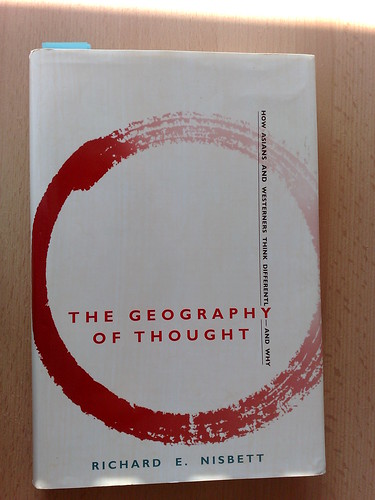The Geography of Thought, How Assians and Westerners Think Differently and Why explica a través de diversos estudios como diferentes personas de diferentes partes del mundo reaccionan de forma diferente a diferentes cuestiones y problemas.

De la contraportada
The Circle and the Line…
‘Cultural psychology has come of age and Richard Nisbett’s book will surely become one of the canonical texts of this provocative discipline. The Geography of Thought challenges a fundamental premise of the Western Enlightenment – the idea that modes of thought are, ought to be, or will become the same wherever you go – East or West, North or South – in the world’ – Richard A. Shweder, anthropologist and William Claude Reavis Professor of Human Development at the University of Chicago.
‘I have long been following Richard Nisbett’s groundbreaking work on culture and cognition. After so many fascinating experiments, challenging hypotheses, and passionate debates, it was a great time for Nisbett to share his ideas and findings wiht a wider public. The Geography of Thought does this superbly!’ Dan Sperber, author of Explaining Culture: A Naturalistic Approach
‘An important, research-based challenge to the assumption widespread among cognitive scientists that thinking the world over is fundamentally the same’ Howard Gardner, Hardvard University, author of Frames of Mind: Theories of Multiple Intelligences.
‘This is another landmark book by the University of Michigan psychologist Richard E. Nisbett. Nisbett shows conclusively that laboratory experiments limited to American college students or even individuals from the western hemisphere simple cannot provide an adequate understanding of how people, in general, think. The book shows that understanding of how individuals in esastern cultures think is not just nice, but necessary, if we wish to solve the problems we confornt in the world today. We ignore the lessons of this book at our peril.’ Robert J. Sternberg, IBM Professor of Psychology and Education; Director, Centre of Psychology of Abilities, Competences, and Expertise (PACE center), Yale University; President-Elect, American Psychological Association.
‘The cultural differences in cognition, demonstrated in this ground-breaking work, are far more profound and wide-ranging than anybody in the field could have possibly imagined just a decade ago. The findings are surprising for uniersalists; remarkable for cultaralists; and regardless, they are most thought-provoking for all students of human cognition.’ Shinobu Kitayama, Faculty of Integrated Human Studies, Kyoto University.